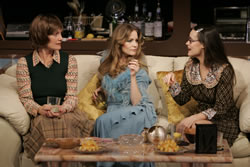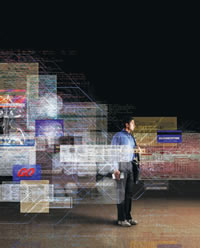HotReview.org Editor's
Picks
Shows Worth Seeing:
 Abigail's
Party
Abigail's
Party
By Mike Leigh
The Acorn Theater
410 W. 42nd St.
Box office: (212) 279-4200
The director Scott Elliott’s natural affinity
for Mike Leigh’s sprawling, abrasive and riskily improvisational
plays has been evident since The New Group’s 1995 inaugural
production of Ecstasy. Elliott has a knack for focusing
Leigh’s diffuse material by locating the preternaturally
aggressive core within each awful situation and magnifying it
through fluidly controlled ensemble work. Abigail’s
Party, Leigh’s best-known play in Britain, was written
in 1977 but has never before been produced in the U.S. You can
tell why. Its crucially specific milieu of crass upward mobility
in 1970s middle-class Britain is no cinch for American theater
folks to understand, let alone replicate, yet Elliott’s
perceptiveness and finesse with actors once again wins out. Jennifer
Jason Leigh plays Beverly, the housewife-hostess from hell, who
invites some neighbors over for cocktails and subjects them to
some astonishingly rigid notions of fun—including compulsory
gin-drinking, obligatory pop music, and deliberate avoidance of
extended conversation. As the gathering drones on (with Leigh’s
nasally sing-song voice as the main drone), a party thrown by
a neighboring teenager grows louder and more out of control, while
the teen's mother gets quietly sloshed in passive obedience to
Beverly. This thoroughly irritating evening somehow amounts to
much more than irritation in the end, rising above its particulars
to sound a horribly essential note about the vacuous essence of
consumer-age consciousness.
--------------------------------

Super Vision
By The Builders Association and dbox
BAM Harvey Theater
(closed)
Kasser Theater
Montclair State University
Dec. 8-10
Box office: (973) 655-5112
The Builders Association’s latest multi-media
piece (a collaboration with dbox, directed by Marianne Weems)
is well designed to confirm most prejudices. If you think slick
digital technology on a live-action stage necessarily means shallow
narrative, you’ll find that here. If you think the interaction
of real actors with virtual actors is a sure recipe for woodenness
on both sides, this show will pose no counter-argument. And if
you think everything interesting has already been said about the
Big Brother dangers of data-collection in the digital age, the
banalities of the 3 overlapping stories in Constance de Jong’s
text for Super Vision will reassure you that’s
true. Still, there are windows of surprise and satisfaction, for
anyone open to discovering them. The video-game digital technique,
for instance, is dazzling and a lot of fun. Also, the scenes do
have some moments of interesting complexity. A foreign businessman
marked as a suspicious “person of interest” by the
computer system at U.S. Passport Control, for instance, is repeatedly
subjected to intrusive personal questioning, until he figures
out that he can ease his passage by volunteering personal information
that the immigration officers don’t have and speaking to
them as old friends. A woman in New York (described as part of
the “young digirati”) speaks by video-phone with her
grandmother in Sri Lanka, but only the old woman actually stays
by the computer camera, chattering away as the granddaughter obsessively
multi-tasks—looking up information, making other calls on
her cell. This deliberate distraction gives a fresh twist to the
breakdown of close human contact that occurs later when the grandmother
loses her memory. There’s both more and less in Super
Vision than meets the eye as digital candy. No masterpiece,
it's nevertheless well worth a visit.
